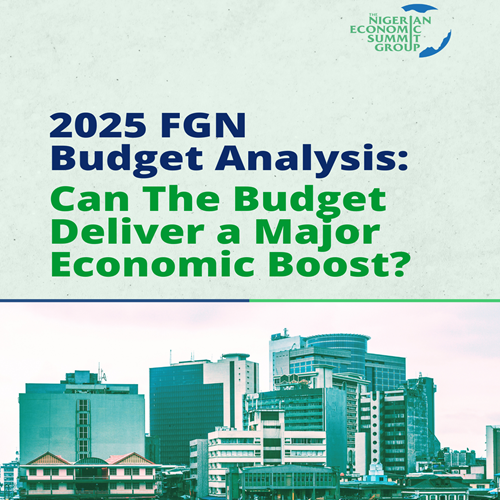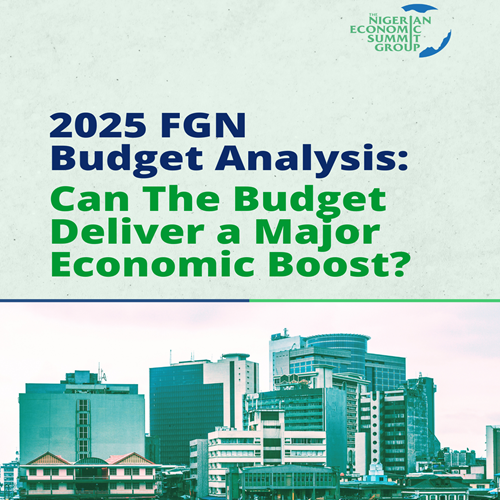Posted Thu, May 21, 2020 3:24 AM
SPORTS MINISTRY, NESG HOLD WEBINAR ON OPPORTUNITIES FOR THE SPORTS SECTOR IN A POST-COVID NIGERIA

The Sports Industry Thematic Group (SITG) of the Nigerian Economic Summit Group (NESG) in collaboration with the Federal Ministry of Youth and Sports Development held a webinar with the theme “Post-COVID Nigeria – Impact and opportunities for the sports sector” on Thursday 7th May 2020.
Head of the SITG, Ms. Nkechi Obi welcomed participants to the webinar and said that the sports industry, pointing out that the industry has been adversely affected and there was a need to re-strategize going forward.
The Honourable Minister for Youth and Sports Development. Mr. Sunday Dare while delivering the keynote address said that the sports industry will face problems in the short to medium term, considering the fact that most sports are contact related, the Sports economy is mostly cyclical i.e. two to four years and the COVID19 pandemic has majorly brought the sector to a halt, affecting stakeholders and reducing investment in critical infrastructure. As much as US$65 Billion has been lost as a result of postponement and cancellation of several major events and leagues across the world
The Minister also posited that the Nigerian sports sector can leverage on the unique circumstances and challenges posed by COVID-19 as an opportunity to rethink policy direction, innovate and reassess priorities in the long run which are in line with the 4 Key Thematic Areas of Incentives, Investment, Infrastructure and Policy (3Is and 1P). The crisis presents an opportunity to weave a new fabric for sports in the society that is the business-focused and private sector is driven, while also delivering on the social and community aspects of the sport as a grassroots-driven industry
Concluding his opening address, the Honourable Minister highlighted several areas of consideration - Better lifestyle choices, Investment, Grassroots/Community Development, Manufacturing, Employment and Jobs, Professionalisation and Digital technology, revealing that Post-COVID Nigeria also presents an opportunity for the country to review the role of the sports industry from a passive sector to a revenue contributor to Nigeria’s Gross Domestic Product (GDP) and examine critical areas that might assist in setting sports on an industrialisation pathway, chief of which is a fit-for-purpose National Sports Industry Policy – the reason for engaging participants in the webinar, to be able to get their contributions into such an important document
During the panel session, Dr. Simon Ebhojaiye, Ag. Director Federations and Elite Athletes Development Department, Federal Ministry of Youth and Sports Development revealed that the COVID19 pandemic has presented Nigeria with an opportunity to focus on online technical and capacity training for athletes and coaches and also provided a window to increase participation in technology driven sports such as e-sports.
Mr. Emeka Enyandike, CEO Digital Sports Africa made it known that Nigeria needs a database of its sports industry which should include number of sportsmen and women, coaches, infrastructure etc to help enhance our Post Covid19 response. “We have too many people working in sports organisations in Nigeria who have no business working there. We need to make sports industry education a priority.” Mr Enyandike concluded.
The President of the Badminton Federation of Nigeria, Mr Francis Orbih who spoke on how Federations would need to adapt their organisation and regulation of their various sports to take advantage of the opportunities thrown up in a post-COVID19 Nigeria, said that there is an urgent need to fast track the development of a national sports policy that will enable Federations to realign their priorities and assist in the delivery of an industrialised sports sector post-COVID19.
On his part, Engineer Opeyemi Okunoren, Founder Silicon Harbour Investments Limited revealed that COVID19 has had a serious impact on the global sports industry and there is a need for the sports industry to embrace technology to become more competitive going forward. He outlined various opportunities in the IT sector that sports can leverage to create the kind of content that would attract top IT players such as Telecomms companies as well as Fintech organisations who rely on the kind of huge numbers that sports can deliver, to generate revenue in their businesses – a possible and profitable symbiotic relationship between sports and technology in Nigeria
While delivering her remarks, Ms Yewande Sadiku, Executive Secretary / CEO Nigeria Investment Promotion Council (NIPC) reiterated the importance of ensuring that government policies are relevant across the various sports value chain for the transformation of Nigeria’s sports industry into a revenue spinner. She posited that for sports to be truly attractive to investors and encourage the quantum, of investment required to industrialise the sector, sports must ensure that it is also commercial in nature apart from its social and community development platform
The last Speaker, Mr John Opubor, Principal Partner Coronation Capital pointed out conditions needed to be put in place to attract private investors to step in to help develop Nigeria’s sports industry and that there was a need for private intervention to focus on technology-enabled solutions to fast track the growth of the sports sector post-COVID19. Mr Opubor also highlighted the fact that where serious changes in how a sector operates have been put develops, those changes were targeted at delivering what he called, “A Moon Shot Moment” – named after the developments in technology that gave rise to new products and which arose from all the research that went into delivering a man on the moon during the Apollo 11 Mission in America. He concluded by asking that the industrialisation process driven by the Sports Reform Agenda of the Ministry and NESG, should decide on a “Moon Shot Moment” for the sports industry in Nigeria and aim the industrialisation agenda towards that
Mr Udeme Ufot, Co-chair of the Sports Industry Working Group (SIWG) while delivering the closing remarks thanked all participants and urged sports organisations and clubs to engage with fans and marketing platforms; to raise revenue from new and alternative sources, positing that sports in the post-COVID19 Nigeria presented numerous opportunities to do things differently and achieve better success
Mr Gabriel Aduda, Permanent Secretary of the Ministry and Co-Chair of the SIWG, in his concluding remarks, reiterated the Ministry’s commitment to the industrialisation of sports and promised that all hands were on deck to deliver on the Honourable Minister’s commitment of a National Sports Industry Policy within the next 2 months
The session was wrapped up by Mr Peter Nelson, Director, Planning, Monitoring and Information of the Ministry, who provided a summary of the event and the next steps thereon – the drafting of a new National Sports Industry Policy
Participants then took a zoom group picture at the close of the event
Find a blog post
Latest Releases

2025 FGN Budget Analysis: Can Th .. Read
2 days ago

2025 FGN Budget Analysis: Can Th .. Read
2 days ago
_1745876187.png)
Industrial Policy Commission Gen .. Read
2 weeks from now
